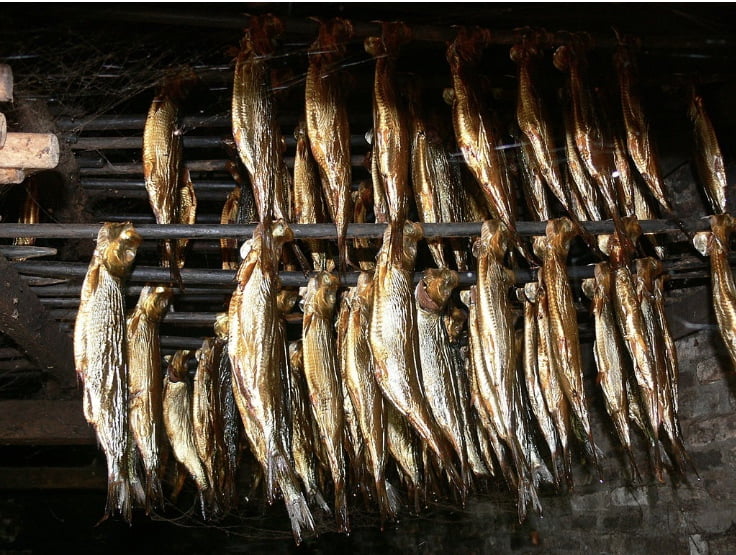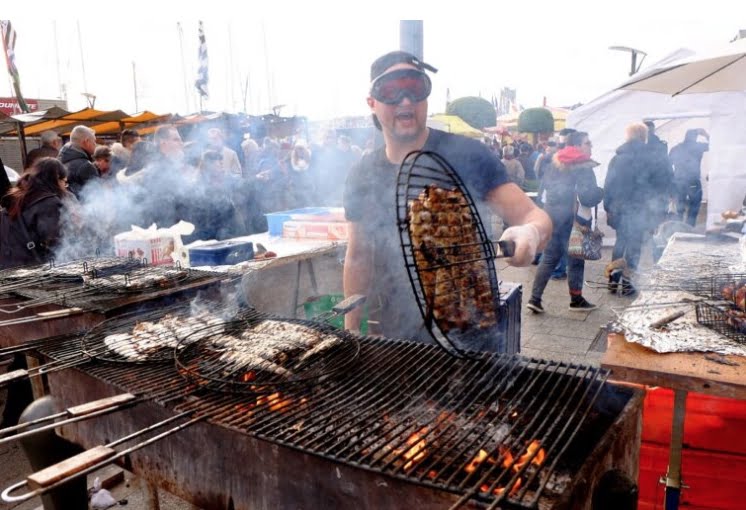The irreverently wonderful C15th northern French poem, The Life of Saint Herring, glorious martyr, introduced and translated into English
MARTYRED SAINT

The anonymous northern French poem, The Life of Saint Herring, Glorious Martyr (La Vie de Saint Hareng), dates from the mid to late C15th. It is what is known in French as a sermon joyeux, a kind of medieval monologue, growing out of the carnival traditions of the old fête des fous (festival of fools). They were performed without music to audiences that ranged across the social classes.
They could be rude (scatological or sexually explicit) and mock society and religion. The mock hagiography was popular, as was the celebration of food – there’s also a Sermon de Saint Jambon et Sainte Andouille (Saint Ham and Saint Tripe Sausage). The performers would often dress up as members of the clergy.
Cambridge professor Dr James Wade discovered the first English mention of red herring in a late C15th collection of similar texts, The Heege Manuscript, held in the National Library of Scotland. Copied from the lost aide-mémoire of a minstrel gigging in England’s East Midlands, red herring crops up in a prose mock sermon. Writing around the same time, the Saint Hareng poet talks of two kinds of herring – L’un est sor, l’autre est blanc. White herring is just salted. Sor (hareng saur) is salted and smoked: in the C15th exclusively red herring. Saur probably derives from sorrel, a reddish-brown.
In the C15th herring was mocked in France, England and elsewhere. In 1429, the Battle of Rouvray, a defeated ambush of an English wagon train, was quickly renamed by the French, the Battle of the Herrings. Ten years later, the Archbishop of Rheims banned his canons’ traditional end-of-Lent Procession of the Herrings as religiously inappropriate.
It’s quite possible, Shakespeare’s, Jonson’s and Nashe’s extensive 1590s use of the Red Herring Joke drew on the hareng saur martyrdom joke at the heart of Saint Hareng. It’s tempting, in particular, to imagine Thomas Nashe coming across a copy in the library of Lord Strange, when he wrote The Choise of Valentines or the Merie Ballad of Nash his Dildo.
In the C15th the herring was an established subject for mockery in France as elsewhere: 1429 had seen the Battle of the Herrings and ten years later Rheims’ end-of-Lent Procession of the Herrings was banned after more than a hundred years. It’s possible, William Shakespeare’s, Ben Jonson’s and Thomas Nashe’s extensive use of the Red Herring Joke drew on the martyrdom joke at the heart of Saint Hareng. It’s particularly tempting to imagine Nashe coming across a copy of the poem, along with some of the more sexually explicit examples of the sermon joyeux in the library of Lord Strange, for whom he wrote The Choise of Valentines or the Merie Ballad of Nash his Dildo.
Meanwhile, Saint Hareng‘s poke at the Dominicans (Aussi fait-il aux Jacopins) almost certainly refers to the story of St Thomas Aquinas, the Dominican philosopher, who on his death bed in Italy, said he might be tempted by some fresh herrings, but then wasn’t, even though God miraculously provided some. The Dominicans were known as the Jacobins, because their first Paris convent or abbey was in the Rue St Jacques. They set up their main convent in Toulouse with the Church of the Jacobins. The poem’s earlier joke about Saint Lawrence is that he was martyred on a large gridiron. He is reputed to have said to his tormenters, You can turn me over, I’m done on this side.
There are different versions of Saint Harenc, suggesting it was widely distributed. Some stop at the proverb of the stinking herring. The version translated here was taken from Isabelle Clauzel’s book of the same name, exploring the history of Normandy’s herring fishery. The Hundred Years War saw France regain Normandy, but just looking at the herring traditions, the continuing links are clear. When William the Conqueror died in 1087 and William Rufus became King of England, the other son, Robert, got to be Duke of Normandy. One of his early acts established a herring fair at Fécamp, perhaps using the model of Yarmouth to create a strong centre for the Norman fishery. Herring fairs attracted fishermen from far and wide and provided the opportunity for fish-based cultural exchange.
Clauzel suggests the Saint Hareng poet’s use of language indicates he was from North West France rather than Normandy, although it feels like he was playing to Normandy audience. She also suggests he was consciously writing with at least an ear to the lowlife lays of François Villon. The sermon joyeux formed one of the influences on Rabelais, the great C16th celebrant of the grotesque. Clauzel credits the C19th Boulogne antiquarian Ernest Deseille with rescuing Saint Hareng for posterity, although it seems to have been published in various editions in the early C16th.

I’m reliably informed it was still being learned by pupils at French lycees in the 1970s and 80s. In the month of November, Normandy celebrates the herring today with fairs in Le Tréport, Dieppe, Saint Valery en Caux and Fécamp. It may be worth noting, for his victory at the Battle of the Herrings, John Fastolfe (or Falstaff) was granted the living of Caux.
The sermon joyeux was traditionally written in four stressed/eight syllable line couplets with alternating male and female rhymes. The Saint Hareng poet isn’t entirely strict, there are no male or female rhymes in English and some of his rhyming is a bit dodgy. The translation here, in loose iambic tetrameters, pays homage to a poet who knew he could get away with things in performance.
The Life of St Herring, glorious martyr
(Late C15th, Anon)
Good people, listen to my sermon.
The season of Saint Grape is calling,
Pilgrims all must to their walking,
Seek salvation from these days,
While out upon the salty waves
Between Boulogne and England’s chalk,
Where there’s no land on which to walk,
Is where began Saint Herring’s ills,
Worse than Saint Lawrence on his grill:
This was his site of martyrdom.
Forty masters all as one,
Day and night their hard-won wrestle
Hauled him to the restless vessel,
With their nets and with their lines,
Along with hundreds of his kind:
That’s how we saw Saint Herring caught.
But winds blew up, so far from port,
So strong all feared that they would drown
Yet they came safe to Dieppe Town
Where they displayed his holy body.
Fresh from the inn, some drunk, O Lord, he
Spotted him by candlelight,
Took him back there in the night,
And ate him, roasted to perfection,
With an allium selection.
The rest were all packed off, of course,
To Paris by the fastest horse,
Where some were barrelled up in salt
Whilst others, though without a fault,
To the smoke and flames were led:
The outrage turned our saint bright red,
Hanging from the smokehouse rafter
Like a thief gets his hereafter –
Except that thieves are rarely dressed
With vinaigrette and watercress.
But pay no mind, that’s all as nothing,
This blessèd saint we’ve been discussing
Found himself minced up with onion
For two jokers’ own consumption:
Before he knew, he found that they
Had turned him into Saint Paté.
In Lent, the season of our fasting,
Everyone cries out for herring:
In Paris he’s deemed so delicious
The taste of him’s considered precious;
Those whose phlegm could see them off,
His holy bones will make them cough;
And honest men know landlords bless
Saint Herring for his saltiness.
His bounty travels through the nation,
Not only granting meagre rations
To Carmelites and Augustinians,
But even to the Jacobins.
Saint Herring visits every home
From here as far as far-off Rome,
A welcome sight where’er he wanders,
Across to England, up to Flanders,
In Burgundy and up the Seine,
And down to Portugal and Spain,
The mountains and the plains of France,
In Lombardy and in Provence,
In Normandy and in Lorraine,
In Berry and in Aquitaine,
By Loire in wicker basket
He is carried to each market,
In procession through the world.
This saint, whose life is here unfurled,
Was born at sea: his holiness
Allows no taint of bitterness,
Eat as many as you wish,
Each one will taste as sweet a fish,
But just as he once loved to drink,
On this he likes to make us think:
Saint Herring’s eaters all must first
Consider how they’ll quench their thirst.
As I have said, two ways of curing
Keep us all supplied with herring:
There’s the red and white as well
And should you ask, yes, they both smell.
With all such questions of the nose
It’s as the well-known proverb goes,
The herring stinks, it’s in his nature;
Ripe bouquets beget adventure.
The poor cannot afford to question
Cheap fish offering salvation,
Yet he seems all grace and ease
When on a plate and served with peas.
In Lent, when there’s no fat for frying,
They all smell good or am I lying?
Good village folk in every cottage
Cook their pots of herring pottage.
Alas, Saint Herring, he should be
Martyred quite so frequently!
But, from here to Angoulême,
Each time he burns it’s just the same.
Saint Herring will be martyred still,
Whether we, upon the grill
Or on hot coals, inflict his pain.
His season, yet, will come again,
His miracles both strong and sure
And better than some snakebite cure.
Now you’ve heard Saint Herring’s sermon,
It’s time for us to beg God’s pardon
For our sins of this past year
And all the years that we’ve passed here,
Three hundred years of pardons won
And ten more months: it’s nobly done;
So let us now pray for the poor,
Lord, compensate their lack of ore.
In need to God they all have cried –
May it please Him turn the tide;
Now cardinals and bishops, who
Perhaps may need our prayers too –
Those first shall be the last ones through;
So let us fall upon our knees,
O Lord, do not forsake us, please.
These days of turmoil, good or ill,
Will surely one day count for nil:
Amen should be our only meaning.
Here ends The Life of Saint Herring.
Acknowledgements
See also
- AQUINAS, ST THOMAS
- BATTLE OF THE HERRINGS (1429)
- CALLER HERRIN’ (SONG)
- DIVINE PROVIDENCE
- DUMAS ON HERRING
- EYVIND SKÁLDASPILLIR
- FASTING
- HARENG SAUR
- HARENG SAUR MONOLOGUES
- HERRING BUSS (TUNE)
- HERRING’S HEAD
- LOCKMAN, JOHN
- LOCKMAN’S VAST IMPORTANCE
- MONKEY BUSINESS
- NASHES LENTEN STUFFE
- NEUCRANTZ: ON HERRING (1654)
- PROCESSION OF THE HERRINGS
- PROPHETIC HERRINGS
- RED HERRING
- RED HERRING JOKE, THE
- SINGING THE FISHING
- WILLIAMS, WILLIAM CARLOS: FISH
